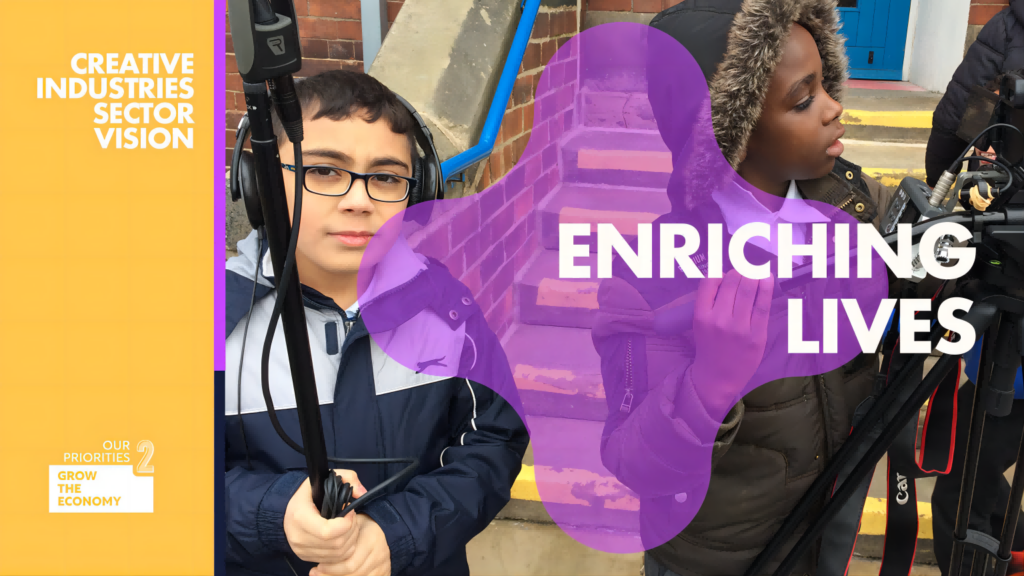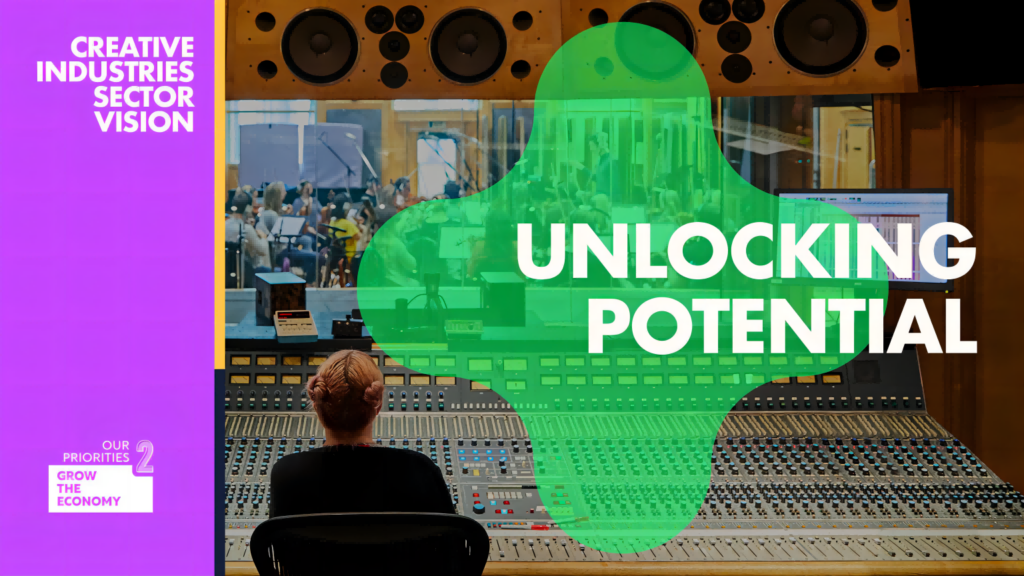AMBITIOUS PLANS TO GROW THE ECONOMY AND BOOST UK CREATIVE INDUSTRIES BY £50B
New plans to maximise the potential of the UK creative industries and grow the economy were set out by the government on 13 June.
One of the Prime Minister’s priority sectors for economic growth, the creative industries are a global British success story growing at more than 1.5 times the rate of the wider economy over the past decade and contributing £108 billion in gross value added (GVA) annually.
Employment in these industries has grown at five times the rate of the rest of the economy since 2011. Speaking at the London Tech Week conference on 12 June, Prime Minister Rishi Sunak said that Britain’s creative industries were “going like gangbusters” and represent a “unique strength” for the country.
Developed with industry via the Creative Industries Council, the Creative Industries Sector Vision published today sets out shared ambitions to build on that success and maximise the growth of the creative industries by £50 billion by 2030, creating one million extra jobs and delivering a creative careers promise that builds a pipeline of future talent.
Framed around the key principles for driving growth – facilitating innovation and investment, alongside building a skilled workforce – the Sector Vision is backed by £77 million in new government investment for the sector.
The creative industries are a true British success story, from global music stars like Adele and Ed Sheeran to world-class cultural institutions like the National Theatre. These industries have a special place in our national life and make a unique contribution to how we feel about ourselves as a country.
We want to build on this incredible success to drive growth in our economy – one of my key priorities – and to ensure that UK creative industries continue to lead the world long into the future. Backed up with significant new funding, this ambitious plan will help grow the sector by an extra £50 billion while creating one million extra jobs by 2030.
Rishi Sunak, Prime Minister
The imagination and ingenuity of British designers, producers, content creators, writers and artists are spearheading growth right across our economy. The government is backing our creatives to maximise the potential of the creative industries.
This Sector Vision is about driving innovation, attracting investment and building on the clusters of creativity across the country. And from first days at school to last days of work, we will nurture the skills needed to build a larger creative workforce to harness the talent needed for continued success. Working with the industry, this vision is helping the UK creative sectors go from strength to strength – providing jobs and opportunities, creating world leading content and supporting economic growth across the country.
Lucy Frazer, Culture Secretary
Our Creative Industry isn’t just about the glitz and glam of the red carpet in Leicester Square. It brings in £108 billion a year to help fund our public services, supports over 2 million jobs, and is world renowned. That’s why we’re backing it as an industry to drive our economic growth, keeping the UK at the top of the world’s cultural charts with a multi-million pound boost.
Jeremy Hunt, Chancellor of the Exchequer
This includes £50 million to grow clusters of creative businesses in locations all over the country, and more funding to help start-ups scale-up and to turn creative entrepreneurs into CEOs.
New investment will help the next Adele, Ed Sheeran or Sam Smith break into overseas markets, alongside financial support for new video games studios and hundreds of grassroots music venues. The government will continue to offer competitive creative industries tax reliefs to incentivise production of film, TV and video games in the UK.
This sector vision builds on more than £230 million in government spending on the creative industries since 2021, which includes £75.6 million to build the largest virtual production research and development network in Europe to put the UK at the forefront of advancements in visual effects, motion-capture technology, and AI for the screen industries and live performance. On 13 June, the government has announced regional research labs will be based in Yorkshire, Dundee and Belfast with a national lab in Buckinghamshire. The programme will be supported with an additional £63 million investment from industry.
Alongside investment, the Sector Vision commits the government to a new creative careers promise – a pledge backed by a comprehensive package of actions to open up more opportunities, particularly for young people, to pursue careers in the creative industries.
The Creative Industries are coming of age with this ambitious policy framework for economic growth and cultural value. Our Sector Vision, developed jointly with government, champions R&D-led innovation and future skills, drawing on the talent of all our communities. It also promotes positive impact on health and wellbeing, the environment and Britain’s global reach. Helped by the government’s new spending commitments, the work starts now to deliver on this growth agenda.
Sir Peter Bazalgette, Industry Co-Chair of the Creative Industries Council
Innovation, investment and exports
- Four new state-of-the-art research and development facilities will be set up to drive the next generation of screen technology and on-set virtual production, with £63 million of new industry investment announced today on top of the government’s £75.6 million investment. UKRI’s Convergent Screen Technologies and performance in Realtime (CoSTAR) programme is expected to create more than 820 new jobs across the UK.
- The government will invest at least £50 million in the next wave of UKRI’s Creative Industries Clusters programme. This funding will be used to identify and support at least six new clusters specialising in creative subsectors, helping entrepreneurs and businesses in these areas innovate with new technologies, secure investment, and access global markets. It comes as more than 300 creative companies across the UK receive a share of £13 million in government grants today to help them innovate and reach their high growth potential.
- DCMS will increase the budget of the Create Growth Programme by £10.9 million, bringing it to a total of £28.4 million until 2025. The increased funding will enable it to double the number of regions it covers to twelve and support 2,000 businesses to commercialise their ideas and access resources, knowledge and private investment to scale up – turning today’s creative entrepreneurs into tomorrow’s CEOs.
- Funding for the Music Exports Growth Scheme, which provides grants to support touring and help emerging musicians break into new global markets, will be expanded to £3.2 million over the next two years. Past recipients include BRIT award winners Wolf Alice, Dave and Catfish and the Bottlemen, as well as Mercury Prize Winners Young Fathers and BRIT Rising Star nominee beabadoobee.
- DCMS will expand Arts Council England’s highly successful Supporting Grassroots Music Venues Fund, providing an additional £5 million over two years to support around 400 grassroots music venues projects, as the lifeblood of our world-leading music sector and cornerstones of communities.
- The UK Games Fund will receive a £5 million uplift bringing its total funding to £13.4 million over the next two years. Since 2015 the fund has been developing talent and awarding grants to young video game developers and early-stage studios to turn their drawing board ideas into working prototype games and showcase them to investors. The additional funding will mean it can help mature start-ups grow their businesses and attract even more private investment into our booming video games industry.
- Acknowledging UK excellence in holding international showcase events which enhance our soft power and boost creative exports, ministers have agreed new funding of £2 million will go to London Fashion Week for 2023-25 and £1.7 million for the BFI to deliver the London Film Festival 2024.

Skills and education
The Sector Vision’s creative careers promise commits the government to working closely with the industry to give young people from all backgrounds more opportunities to participate in creative activities from an early age, in order to build a highly-skilled, productive and inclusive creative workforce. To support these aims, DCMS and the Department for Education will:
- Publish the Cultural Education Plan later this year, deliver last year’s National Plan for Music Education which includes £25 million for musical instruments, and explore opportunities for enrichment activities as part of the government’s wraparound childcare provision.
- Work with industry to ensure post-16 technical skills routes work effectively for the creative industries. This will include supporting the rollout of T-Levels in creative subjects and increasing provision and take-up of high quality creative apprenticeships.
- Support lifelong learning in the creative industries and enable the sector to retain and retrain the existing workforce by working with local and regional partners to maximise the opportunities of Skills Bootcamps and to develop Local Skills Improvement Plans across England.

The UK has a global reputation for creating, writing and producing amazing music and the Creative Industries generate over £50 billion in exports for the UK economy and are a key driver for UK growth. The Department for Business and Trade is committed to championing our world class artists and businesses around the world by doubling creative trade missions and expanding support for exporters in the creative industries.
Kemi Badenoch, Business and Trade Secretary
The creative industries are a UK success story, key to the UK’s prosperity, wellbeing and resilience. From design to screen, fashion and textiles to heritage, they are generating high-quality employment and innovation.
UKRI’s creative industries investments, including CoSTAR, Creative Catalyst and the Creative Industry Clusters Programme, will catalyse the research and innovation that are crucial for this fast-growing and important sector. The creative industries are now firmly embedded in the research and development ecosystem, ensuring that the UK remains a genuine world leader in the industries of the future.
Professor Christopher Smith, UK Research and Innovation Creative Industries Sector Champion
The UK Government’s Sector Vision recognises and cements the Creative Industries’ immense capacity for growth, and rightly prioritises much-needed investment in the sector. Creative UK, our members, and colleagues across the Creative Industries, stand ready to further unleash the power of creativity, so that together we can drive inclusive growth across all parts of the UK.
Caroline Norbury OBE, Chief Executive of Creative UK and Creative Industries Council member
Source:UK ANIMATION

熱門頭條新聞
- The CES® 2025
- ENEMY INCOMING! BASE-BUILDER TOWER DEFENSE TITLE ‘BLOCK FORTRESS 2’ ANNOUNCED FOR STEAM
- Millions of Germans look forward to Christmas events in games
- Enter A New Era of Urban Open World RPG with ANANTA
- How will multimodal AI change the world?
- Moana 2
- AI in the Workplace
- Challenging Amazon: Walmart’s Vision for the Future of Subscription Streaming
